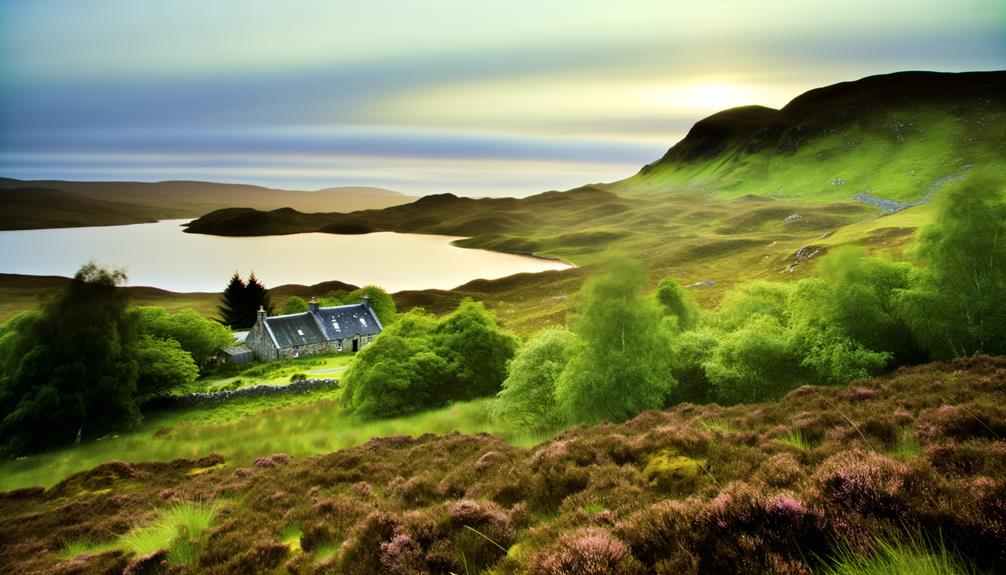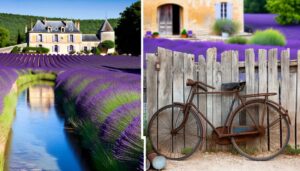Cameron Name Meaning and Origin
The name Cameron has its origins in Scottish Gaelic, derived from 'cam' meaning 'crooked' and 'sròn' meaning 'nose', likely describing an individual with a distinct nasal feature. It has historical roots in the Scottish Highlands, particularly Lochaber, dating back to the 13th century.
The name evolved from the Gaelic 'Camshron' and is closely associated with Clan Cameron, known for their resilience and role in significant Scottish historical events. The name has gained modern popularity, also adopted as a unisex name and influenced by figures like Cameron Diaz.
This multifaceted legacy offers further fascinating insights.

Key Takeaways
- Cameron originates from Scottish Gaelic, combining 'cam' (crooked) and 'sròn' (nose).
- The name likely described someone with a distinctive nasal feature.
- Historically linked to the Scottish Highlands, particularly around Lochaber.
- Clan Cameron has a rich history in Scottish socio-political events and folklore.
- Modern popularity is boosted by its adoption as a unisex name and celebrity influence.
Etymology of Cameron
The name Cameron originates from the Scottish Gaelic words 'cam' meaning 'crooked' and 'sròn' meaning 'nose.' This etymology suggests that the name likely referred to an individual with a distinctive nasal feature.
The combination of these elements formed a surname that has endured through centuries. The linguistic structure of the name is straightforward, marked by its descriptive nature common in Gaelic nomenclature.
Over time, the name Cameron has transcended its initial descriptive purpose, evolving into a prominent surname and given name. This transformation highlights the dynamic nature of linguistic evolution, where words and names adapt but retain their historical roots. Additionally, the Cameron name has a rich history, with origins in Scotland. The Carmichael name origins are also closely linked to the Cameron name, with both having ties to the ancient Celtic people. This deep historical connection adds another layer of complexity to the evolution of these names.
Consequently, the etymology of Cameron offers a glimpse into the descriptive practices of early Gaelic culture.
Historical Roots
Examining the historical roots of the name Cameron reveals a rich tapestry of cultural and social significance that extends beyond its etymological origins.
Tracing back to Scotland, the name Cameron is prominently linked to the Scottish Highlands, particularly the region of Lochaber. Historical records show that the Camerons were a formidable presence in the area as early as the 13th century.
The name is believed to have evolved from the Gaelic "Camshron," meaning "crooked nose," a descriptor that possibly referred to a clan leader. Over centuries, the Camerons have been integral to various socio-political events in Scotland, influencing local dynamics and contributing to regional identities.
This historical depth enriches the name's contemporary resonance and cultural heritage.
Clan Cameron Legacy
Among the numerous Scottish clans, Clan Cameron stands out for its storied legacy, marked by enduring influence and a prominent role in the historical trajectory of Scotland.
Originating in the West Highlands, Clan Cameron was historically centered around the Lochaber region. The clan is renowned for its participation in significant historical events, such as the Scottish Wars of Independence and the Jacobite risings.
The leadership of Clan Cameron, particularly the chiefs known as the Mac Dhomhnuill Dubh, demonstrated remarkable resilience and strategic acumen. Their loyalty to the Stuart cause during the Jacobite uprisings cemented their place in history.
Through centuries of conflict and alliance, Clan Cameron has maintained a reputation for bravery, loyalty, and tenacity, contributing richly to Scotland's historical narrative.
Cultural Impact
In addition to their historical significance, Clan Cameron's influence permeates various facets of Scottish culture, from traditional music and literature to regional folklore and community practices.
The clan's storied past is often celebrated in Scottish folk songs and ballads, which highlight their bravery and pivotal battles. Literary works frequently reference Clan Cameron, incorporating their legacy into broader narratives of Scottish history.
Additionally, regional folklore is rich with tales of Cameron heroes and their legendary exploits. Community practices, such as Highland games, often feature elements that honor Clan Cameron, including specific tartans and symbols.
These cultural manifestations ensure that the clan's heritage remains a vibrant and integral part of Scotland's cultural identity, bridging past and present.
Modern Popularity
The enduring legacy of Clan Cameron extends beyond historical and cultural contexts, manifesting in the modern popularity of the name Cameron as a given name worldwide.
This name has grown in favor due to several key factors:
- Celebrity Influence: High-profile individuals named Cameron, such as actor Cameron Diaz, have elevated the name's visibility and appeal.
- Gender Neutrality: Its adoption as a unisex name has broadened its appeal, making it a versatile choice for parents.
- Global Reach: The name Cameron is not confined to its Scottish origins; it enjoys widespread use in English-speaking countries and beyond.
Conclusion
To sum up, the name Cameron, rooted in rich etymological and historical origins, mirrors a legacy intertwined with the storied Clan Cameron. Its cultural influence spans across generations, maintaining a strong presence in contemporary society.
As the name still conveys a sense of heritage and identity, it serves as a reminder that 'a name is a window to one's soul,' embodying deep ties to history and culture. Its lasting popularity confirms its enduring charm and importance.






